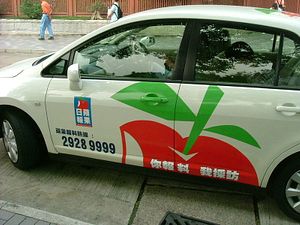The protests in Hong Kong have taken an unusual turn this week, with angry demonstrators gathering outside not government buildings but a newspaper office. Every night since October 12, protestors have amassed outside the headquarters of the Hong Kong newspaper Apple Daily. Their goal: to delay delivery of the paper, which the protestors say is biased in favor of Occupy Central protests going on elsewhere in the city. The sit-ins have continued despite a court order granting Apple Daily a temporary injunction against the protesters.
To opponents of the Occupy protests, the demonstrations outside Apple Daily are poetic justice. Apple Daily is accused of giving favorable coverage to and even helping incite the Occupy movement; now opponents of the movement rejoice that the paper is getting a taste of its own medicine as “illegal” but peaceful protests cause economic harm. Meanwhile, supporters of Apple Daily, including the paper’s journalists suspect that the protesters outside their building do not reflect genuine popular anger. Instead, Apple Daily supporters allege that the protestors are being bussed in and paid to “protest.”
A Huffington Post report by Matt Sheehan described the scene outside the Apple Daily headquarters on Tuesday:
On Tuesday, more than 100 of the newspapers’ employees came out to face down the demonstrators, with both sides hurling insults across police cordons. Journalists kept their cameras clicking and yelled that the protesters should ‘go back to mainland China,’ while the demonstrators denounced the paper’s employees as traitors.
One protester elaborated on the charges against Apple Daily: “They are the human scum of the Chinese nation… They’re put up to it by external forces who are against China and attempting to destroy Hong Kong.”
To the anti-Occupy protesters, Apple Daily has become a sort of avatar for everything they dislike about the movement – and particularly for the charge that the Occupy protests are sponsored by nefarious foreign forces. On Chinese social media sites, Apply Daily founder Jimmy Lai Chee-ying is rumored to have ties to the CIA, and to be funneling CIA funds to the Occupy protestors. In an interview with South China Morning Post, Lai dismissed the idea that he is personally influencing the movement. Lai said that he had not donated any money to the founders of the Occupy Central movement, although he has donated to pro-democracy politicians in the past and is friends with several of them.
Lai’s personal connections aside, the general tone of Apple Daily’s coverage has been used as evidence that the paper is in cahoots with foreign agents. In Beijing’s rhetoric, the Occupy protests were stirred up by the West; thus any paper that supports these protests is simply doing the West’s dirty work by drumming up chaos in China. In addition, Apple Daily was one of the first papers to use the term “Umbrella Revolution.” The term itself became used in mainland China as evidence that the Hong Kong protests were one of a long string of similarly-named “color revolutions” fomented by the West.
On the other side of things, to pro-democrats Apple Daily is a lone bastion of freedom of the press in a media environment increasingly squeezed by Beijing. In a talk at the National Endowment for Democracy back in April, Martin Lee (founder of Hong Kong’s Democratic Party) alleged that Beijing was trying to use economic pressure to squeeze the paper. Lee said that Hong Kong businesses were being strongly encouraged to revoke their advertising deals with Apple Daily in favor of more Beijing-friendly publications. Under this framework, the protests going on outside Apple Daily are easily dismissed as an underhand attempt by pro-Beijing forces to remove a long-time thorn in Beijing’s side.
While the Occupy protests continue throughout Hong Kong, amid disturbing reports of police violence, the protests outside Apple Daily should not be overlooked. The clash between pro- and anti-Occupy sentiments involves many of the factors at play in the broader protests. Most tellingly, it shows the tendency of each side to dismiss its opponents as “puppets” of an outside force, whether Beijing or the West. As the insults fly, the potential for true dialogue grows more and more remote.
































